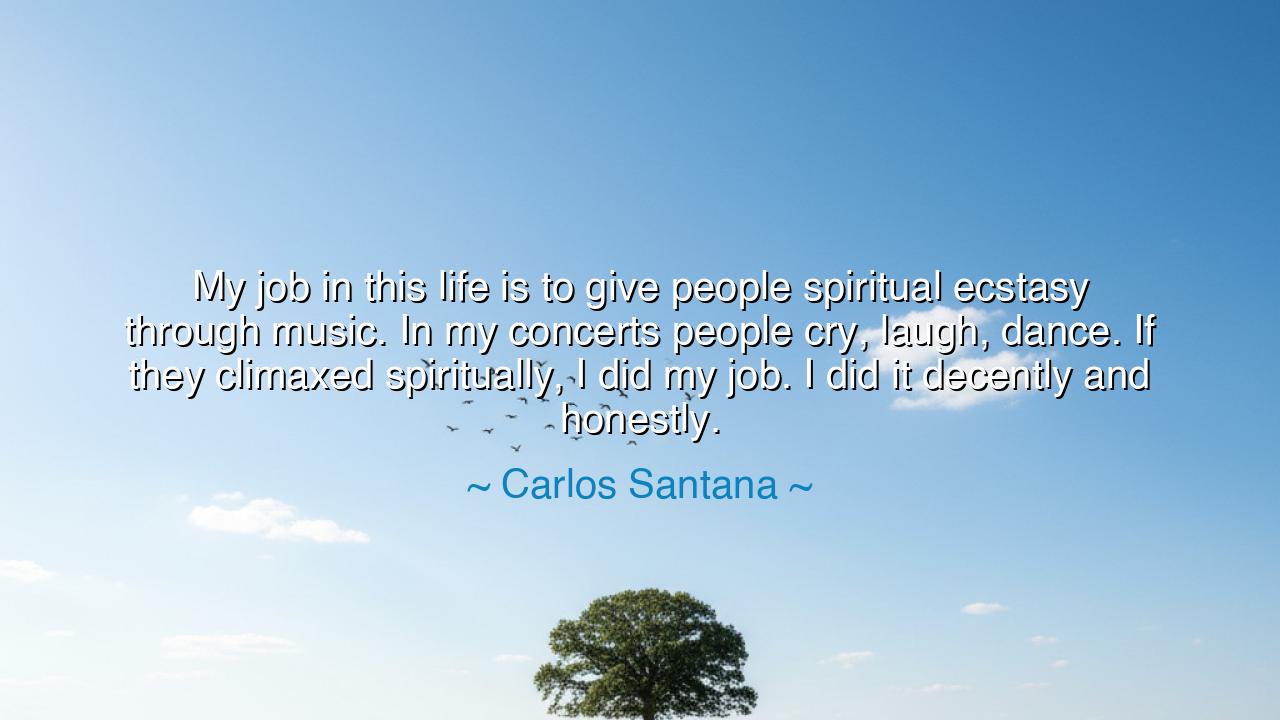
My job in this life is to give people spiritual ecstasy through
My job in this life is to give people spiritual ecstasy through music. In my concerts people cry, laugh, dance. If they climaxed spiritually, I did my job. I did it decently and honestly.






Hear the thunderous yet tender words of Carlos Santana, who declared: “My job in this life is to give people spiritual ecstasy through music. In my concerts people cry, laugh, dance. If they climaxed spiritually, I did my job. I did it decently and honestly.” These words are not the boast of a performer seeking applause—they are the creed of a priest of sound, a servant of spirit, who wields not incense or scripture, but chords and rhythms, to lift the hearts of men and women beyond the veil of the ordinary.
When he speaks of spiritual ecstasy, he speaks of a state beyond pleasure, beyond entertainment. It is that moment when the body trembles and the soul feels itself torn open, revealing something eternal within. Through music, Santana says he becomes a guide, taking his listeners through valleys of sorrow and peaks of joy, until their spirits break free of daily burdens and soar. This is no small ambition—it is the ancient role of the bard, the shaman, the prophet, who through voice and instrument becomes a bridge between the human and the divine.
History testifies to this power. Recall the tale of Orpheus in Greek myth, whose lyre could charm beasts and move even stones to weep. He descended into the underworld, and with song alone softened the hearts of the Furies, persuading Hades himself to release his beloved. Such is the power of true music—it does not merely enter the ear, it pierces the soul. Santana stands in this lineage: a modern Orpheus, whose guitar becomes the lyre of fire, opening doors in the spirit that words cannot touch.
Notice also his humility: “If they climaxed spiritually, I did my job. I did it decently and honestly.” Here is wisdom. For the artist, the task is not ego, not fame, not wealth—it is service. The true musician is not the master of sound but its vessel. Santana does not measure himself by the roar of applause, but by the tears shed, the laughter released, the bodies set free to dance. He asks only if his listeners were changed—if the music carried them into transcendence. In this lies the measure of honest labor: to give fully, without deceit, without corruption, without exploitation.
And what of us, who may not wield guitar or stage? The lesson is the same. Whatever your calling—whether in art, craft, teaching, or daily work—your task is not merely to perform but to uplift. To do your job with such fire and honesty that others are moved, healed, inspired, even transformed. Your work, done with integrity, can be someone else’s doorway to spiritual ecstasy. Just as Santana offers rhythm and melody, so too can a kind word, a just act, a moment of compassion awaken something eternal in another.
There is also the reminder that music—and by extension, all art—is sacred. Too often we treat it as mere entertainment, background noise, or distraction. But Santana speaks the truth of the ancients: art is worship, art is healing, art is transformation. To dance, to weep, to laugh under the spell of music is to touch the eternal. When we allow ourselves to be moved by such beauty, we partake in the divine.
So let the lesson be clear. If you create, create with honesty. If you labor, labor with integrity. If you touch the lives of others, do so not for pride but for service. Seek to bring joy, release, healing, or even tears where they are needed. Like Santana, measure your life not by riches or fame, but by whether others walk away lifted, freer, closer to the essence of their own souls.
Thus we pass on this truth: to give others spiritual ecstasy—whether by sound, by word, or by deed—is among the highest purposes of life. It is to remind the weary that life is more than toil, more than sorrow—that within them still burns a spark of eternity. And if we, like Santana, can awaken that spark, then truly we have done our job “decently and honestly.”






AAdministratorAdministrator
Welcome, honored guests. Please leave a comment, we will respond soon